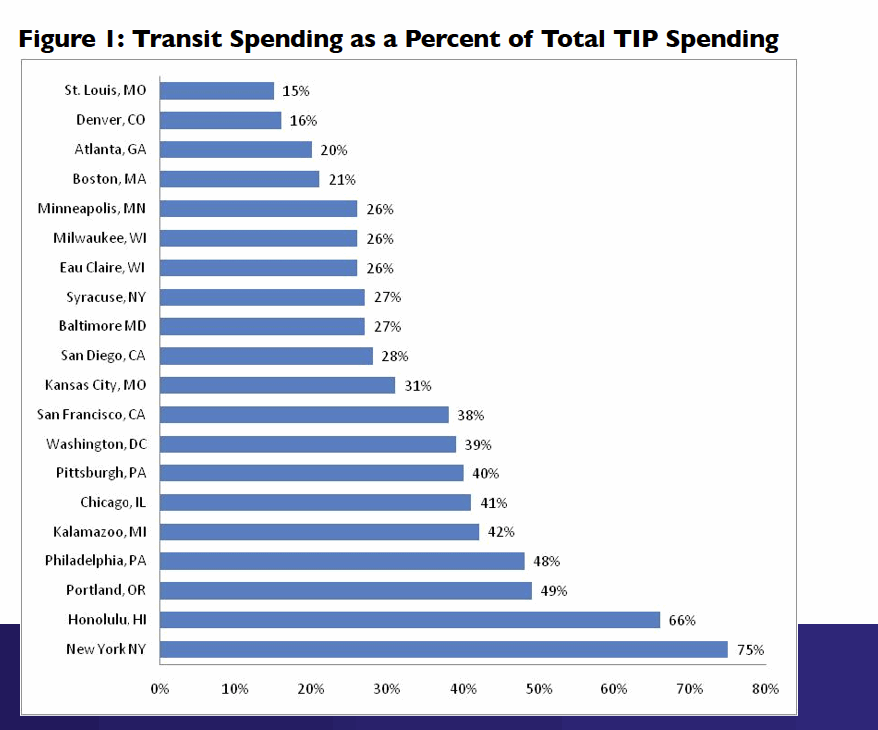TRANSPORTATION EQUITY NETWORK
Executive Summary
Spending on transit generates more jobs than spending on highways.
Based on data from Transportation Improvement Programs (TIPs) in 20 metropolitan areas, this study shows that the proportion of total transportation dollars spent on transit varies from 15 percent to 75 percent.
Metropolitan areas that give a higher priority to transit generate more jobs per dollar spent on transportation.
If our 20 metropolitan areas shifted 50 percent of their highway funds to transit, they would generate 1,123,674 new transit jobs over a five-year period — for a net gain of 180,150 jobs over five years — without a single dollar of new spending.
If federal spending on transit increased as proposed by Transportation for America and TEN, we estimate it would create 1.3 million jobs over the life of the law, and almost 800,000 more jobs than under present federal transportation law (SAFETEA-LU).
Introduction
On September 30, 2009, SAFETEA-LU, the five-year federal transportation law, expired. Congress extended SAFETEA-LU for 18 months and will try to pass a comprehensive reauthorization of federal transportation policy in 2011. With over 14 million Americans out of work, lawmakers need to carefully take into account the effects of different kinds of transportation spending on jobs.
Research has consistently shown that spending on transit creates more jobs than spending on highways. Estimates of job generation include the workers who construct the infrastructure and operate transit, as well as the jobs created by suppliers to the construction industry and by the increased spending of workers in the local economy. Transportation spending also has indirect effects on job creation by increasing the efficiency of the transportation system and improving business productivity. We discuss these longer-term effects in the conclusion.
In two past reports, the Transportation Equity Network (TEN) examined who gets the jobs from transportation spending and the quality of those jobs. In this report we examine the quantity of jobs created. In particular, TEN wanted to know the effect of increased public transit spending on jobs in different metropolitan areas around the country. TEN selected 24 metropolitan areas for the study. Table 1 shows the metropolitan areas and their corresponding metropolitan planning organization (MPO). MPOs are authorized by the federal government to conduct transportation planning within each metropolitan area. Figure 1 shows the locations of these Metropolitan Statistical Areas (MSAs).
This study asks two key questions:
1. What would be the effect on jobs in each metropolitan area of shifting 50 percent of the money spent on highways to public transit?
2. How many jobs would be created in each metro area if we increased funding on public transit at the rate indicated by the Transportation for America proposal for the next transportation autorization act?
The first question addresses the implications of changing local priorities; the second addresses what would happen if federal priorities changed.
In order to answer these questions, we needed to know how metropolitan areas presently spend their transportation dollars. The best way to determine this, we concluded, was to examine the Transportation Improvement Programs (TIPs) in each of our 24 metros. TIPs are federally mandated planning documents produced by MPOs which list all significant transportation projects in the region for which funding has been obtained. TIPs are not wish lists but reflect the actual transportation spending priorities of metropolitan areas.
Download full report (PDF): More Transit = More Jobs
About Transportation Equity Network
www.transportationequity.org
“The Transportation Equity Network is a national grassroots organization that fights for transportation equity. We organize to transform federal transportation and mass transit policy and funding to address the needs of the poor, the working class, the middle class, and people of color in regard to jobs, mass transit, and growth that is smart and equitable.”
Tags: Reauthorization, SAFETEA-LU, TEN, Transportation Equity Network








 RSS Feed
RSS Feed